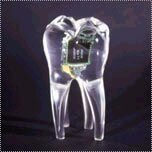|
 James Auger and Jimmy Loizeau, who are now researchers at Media Lab Europe, came up with the idea as part of a future product competition run by the UK's National Endowment for Science, Technology and the Arts while at the Royal College of Art. The project will be on show at the UK's Science Museum for the next six months. James Auger and Jimmy Loizeau, who are now researchers at Media Lab Europe, came up with the idea as part of a future product competition run by the UK's National Endowment for Science, Technology and the Arts while at the Royal College of Art. The project will be on show at the UK's Science Museum for the next six months.
Essentially the futuristic tooth would use wireless technology, such as 802.11 or bluetooth, to take signals from audio devices such as mobile phones, radios, stereos or computers, Auger explained to ElectricNews.Net. These signals would be changed into vibrations that would travel from the tooth, to the skull, eventually creating audible sound in the user's inner ear. No one but the user would be able to hear the sounds.
The two men have not yet built a prototype, and Auger is hesitant to say whether the men would be interested in turning the project into a commercial venture, only saying, "We will just wait and see."
"That was never really our intention," Auger explained. "What we were really interested in was the feedback that the idea generated." He went on to say that part of the project was simply to see how people reacted to futuristic biotechnology that was easily foreseeable, but did not yet exist. "Mostly people were shocked at the idea," Auger claimed.
"Lots of people put it into a medical context...it seems to be quite acceptable to allow technology into the body for replacement purposes such as artificial joints. Lots of people, when they see it, see it as an application that could be used for deaf people, which is not an idea we put out there," Auger commented.
At Media Lab Europe Auger plans to continue to generate ideas about new technologies to gauge what people think about the notion of replacing or enhancing body parts with machines or other technological means. Currently he is working on a project that deals with the social implications of genetic modifications.
"There is huge debate with these kinds of things. If you apply Moore's Law to digital implants, it seems to make sense that in 30 years artificial eyes and artificial ears will be available with superior capabilities to normal eyes and ears," he said. "Would people trade in their natural eyes for ones with night vision or telescopic sites?...And more importantly, how are people going to feel about this sort of thing if they do?"
For more information about Auger and some of his work, visit his Web site.
|



